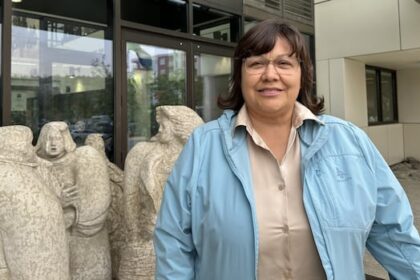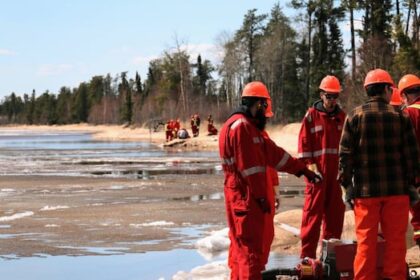A global race to secure critical minerals is threatening to unravel hard-won environmental protections and Indigenous rights, experts warned this week during the United Nations Permanent Forum on Indigenous Issues (UNPFII). Galina Angarova, executive director of the Securing Indigenous Peoples’ Rights in the Green Economy (SIRGE) Coalition, said the world will need approximately 300 new mines by 2035 to meet rising energy demands. In part, mining is driven by climate goals because critical minerals are needed for greener energy sources such as electric vehicles and solar panels. But she says energy demands are also growing to fuel new technology heavily dependent on energy such as artificial intelligence (AI) and military weapons. Angarova said politicians will sell the idea of mining to the public as an important climate initiative, but the reality is, that we are not replacing energy, the world is simply using more energy. “We believe that we’re going to replace fossil fuels, and it’s not happening. It’s not true,” she told delegates. “Unfortunately, energy that is being generated by alternative sources—it’s just being added to the grid.” Angarova, a member of the Buryat Indigenous people in Russia, warned that deregulation is already undermining Indigenous protections. “Use your treaty rights. Use your unceded lands. Use UNDRIP,” she urged Indigenous Peoples in Canada. “At least your government and your courts recognize your rights. I am from Russia and we are 200 years behind you.” Her warning comes as major powers seek to insulate their supply chain’s dependency on China. A 2023 report by the U.S. Government Accountability Office (GAO) found that 75 per cent of the critical minerals used in American weapons systems come from China. “If China decided to no longer sell to the United States, we would lose access to this supply and need to look for alternatives,” the GAO stated. “Unfortunately, the U.S. doesn’t have equivalent substitutes for these materials that perform at the same level,” The GAO is an accountability watchdog that provides reports to the U.S. Congress. “Deregulation is not aligned with Indigenous peoples’ rights and welfare. It’s prompted by protectionist policies. It’s prompted by the pressure to secure supply chains,” warned Angarova. Tom Goldtooth, executive director of the Indigenous Environmental Network and a member of the Navajo Nation, said mining is being rebranded as “sustainable” under the push for critical minerals, but old problems remain. “The word sustainable mining will come up. They’re going to convince Indigenous people it’s not that bad—copper, nickel, zinc, lithium mining—that it can be done responsibly,” he said. “But the question that has always come up, for 30 some years, is what are the legal compliance and enforcement mechanisms at the domestic level? They buy themselves out of being responsible for leaving contamination.” ‘Use your treaty rights. Use your unceded lands. Use UNDRIP,” Angaro urges. Photo: Karyn Pugliese/APTN. Goldtooth said Indigenous people must use UNDRIP – the United Nations Declaration on the Rights of Indigenous Peoples – and other legal mechanisms as mining expands. “It will be important to take time to ensure mining companies are held to environmental, social, and human rights standards as they pursue critical minerals,” he said. In Canada, both the Liberal and Conservative parties have pledged during the federal election campaign to fast-track approvals for resource projects like mining and pipelines— and energy corridors to transport the products to markets in China and Europe. They have argued that in the face of tariffs imposed by U.S. President Donald Trump, and his repeated statements that he would use a trade war to annex, it is crucial to secure new trading partners. Both leaders insist that speeding up approvals will not compromise Indigenous rights or environmental reviews. But Angarova cited the proposed Wonder Valley AI data centre near Sturgeon Lake Cree Nation, northwest of Edmonton, as a troubling example of how projects are already bypassing Indigenous consultation in Canada. Read More: Sturgeon Lake denounces proposed AI data centre on traditional hunting grounds Mining versus a green economy is a question Kitigan Zibi voters will answer in federal election Politicians debate a crisis of tariffs and trade, while in Onigaming the crisis is life and death The $800 million facility, described as the world’s largest AI data centre industrial park, led by businessman Kevin O’Leary, would operate on natural gas and geothermal power. The Sturgeon Lake Cree Nation said it learned of the project only through the media. “Much to our shock, without any prior notice, never mind free prior and informed consent, we learned through press releases… about the proposed GIG AI Data Centre which will have massive effects on our water and our land,” Chief Sheldon Sunshine wrote in an open letter to Alberta Premier Danielle Smith in January. “We have received zero consultation from O’Leary Ventures Inc. and/or the Greenview Municipality.” Sara Olsvig, Chair of the Inuit Circumpolar Council, said estimates shared at COP29 in Baku last November suggested that mineral extraction will need to rise by 40 per cent—and that over half of those mineral deposits lie on or near Indigenous lands. “ Our rights will have to be implemented throughout the process, throughout the value chains, throughout the benefit sharing issues, throughout all production phases,” said Olsvig. “ We can only imagine how huge a pressure there will be on extracting those minerals. So this is a situation where the world needs to come together… making sure that we then do what needs to be done to end the violations of Indigenous people’s rights.” Continue Reading
Surging global demand for critical minerals will diminish protections for Indigenous rights, warn experts
Leave a Comment










